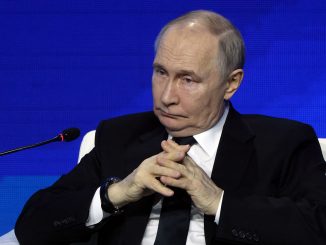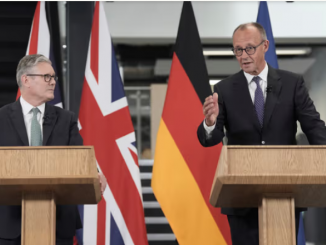
Ukrainian President Volodymyr Zelenskyy attends a news conference at the Chancellery in Berlin on Wednesday. | REUTERS
| Published May 30, 2025
Ukraine said Thursday it was ready to hold more talks with Russia in Istanbul next week but again demanded that Moscow supply a document setting out its conditions for peace.
Hopes for a potential breakthrough in the prolonged war between Russia and Ukraine have been thrown into uncertainty, as Russia publicly claimed that Ukraine has not responded to its proposal for peace talks scheduled for June 2 in Istanbul. The lack of confirmation from Kyiv adds a layer of complexity to an already fragile diplomatic process, despite mounting international interest and growing involvement from Western powers.
On May 29, Russian officials reiterated their invitation to Ukraine for high-level negotiations in Istanbul aimed at forging a path toward de-escalation. The talks were announced as part of a renewed international push involving the United States, the United Kingdom, France, and Germany—all of whom have agreed to send national security representatives to the discussions, according to U.S. envoy Keith Kellogg.
Moscow framed the proposed talks as a “real opportunity” to consolidate the various proposals offered by both sides over the past year. Russian state media has emphasized that a draft framework—consisting of provisions on ceasefire logistics, territorial questions, and humanitarian access—had been readied for discussion. However, Ukraine’s government has remained publicly silent, neither accepting nor rejecting the invitation.
Ukrainian President Volodymyr Zelenskyy’s office has yet to issue a formal response, prompting speculation about Kyiv’s hesitancy. Analysts suggest Ukraine may be concerned about the optics of entering peace talks while Russian forces continue to bombard Ukrainian cities with missiles and drones, most notably after a recent escalation following a reported phone call between former President Donald Trump and Russian President Vladimir Putin.
Ukraine has consistently maintained that any negotiations must uphold its territorial sovereignty, particularly with regard to Crimea and regions of the Donbas currently under Russian occupation. Sources close to the Ukrainian foreign ministry noted that officials are “evaluating the conditions and security guarantees” surrounding the proposed Istanbul summit before making any commitment.
Meanwhile, Western officials appear eager to lend credibility to the peace process. In a significant shift from earlier positions, France, Germany, and the UK are now expected to play a direct role in the dialogue. This change reflects a recognition that resolving the conflict requires a broader diplomatic front, not just bilateral or U.S.-led initiatives.
Though the situation remains fluid, the Istanbul summit could be a pivotal moment—if Ukraine chooses to participate. Observers believe that even symbolic participation by Kyiv could open the door to a phased agreement, starting with humanitarian corridors, prisoner exchanges, or temporary ceasefires in contested zones.
However, without Ukraine’s involvement, the summit risks becoming a one-sided affair, potentially used by Moscow to claim diplomatic legitimacy without meaningful progress. The next 48 hours are seen as critical, with envoys and international stakeholders closely monitoring Kyiv for signs of engagement.
Here are the implications of Ukraine’s silence in response to Russia’s proposed June 2 peace talks in Istanbul:
1. Stalled Diplomatic Momentum
-
Without Ukraine’s participation, the proposed talks risk falling apart or losing credibility.
-
A missed opportunity could delay any meaningful diplomatic breakthrough and prolong the conflict.
2. Narrative Control
-
Russia may exploit Ukraine’s silence to frame itself as the party seeking peace, potentially swaying neutral or international opinion.
-
Conversely, Ukraine’s caution suggests it’s avoiding a negotiation under pressure or unfavorable terms.
3. Strained Alliances
-
Western allies, especially those preparing to join the talks (US, UK, France, Germany), may grow frustrated if Ukraine appears unwilling to engage diplomatically.
-
But if Ukraine sees the proposal as a trap or a PR move, declining to respond could also be seen as strategic restraint.
4. Risk of Escalation
-
The absence of diplomacy could embolden Russia to intensify military operations, especially after the recent strikes following Putin’s call with Trump.
-
It also heightens the risk of regional instability and humanitarian crises.
5. Pressure on Ukraine’s Leadership
-
Domestically and internationally, President Zelenskyy faces mounting pressure to balance defense priorities with openness to peace.
-
His next move could define Ukraine’s diplomatic strategy and relationships with key Western partners.
Overall Takeaway:
Ukraine’s silence on Russia’s proposed June 2 peace talks in Istanbul underscores the deep mistrust and fragile conditions surrounding any attempt at diplomacy in this ongoing conflict. While the involvement of Western powers signals renewed international interest in brokering peace, Kyiv’s hesitation reflects concerns about legitimacy, security, and sovereignty. Without Ukraine’s participation, the summit risks becoming symbolic at best—and a propaganda tool at worst.
SOURCES: FRANCE 24 – Ukraine renews demand to see Russia’s peace terms
JAPAN TIMES – Ukraine renews demand to see Russia’s peace conditions ahead of talks





Be the first to comment